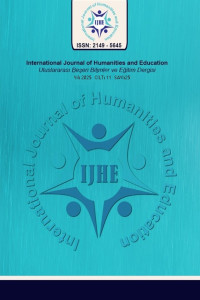Abstract
Bu çalışmada George Orwell’ın 1984 ve Bilge Karasu’yun Gece adlı romanlarında distopik temalar karşılaştırmalı olarak incelenmiştir. 1984 ve Gece romanları totaliter bir rejimin gölgesinde bireyin düşünce dünyasını, kimliğini, hafızasını hedef alan bir düzen eleştirisidir. Çalışma boyunca her iki eserde de totaliter rejimin bireyin ve toplumun üzerindeki denetimini sağlayan toplumsal kontrol mekanizmalarına odaklanılmış; 1984 romanında sunulan sistemle Gece romanındaki yapının benzer ve farklı yönleri irdelenmiştir. Totaliter rejimlerin yapısal özelliklerinin çözümlenmesinin yanında toplumun nasıl kontrol altında tutulduğuna dair uygulamalar tespit edilmiş ve açığa kavuşturulmuştur. Her iki eserde de rejim, ana karakterin karşısında duran ve onu sindiren bir güç olarak belirlenmiş; bireyin özgürlüğe ulaşmasının önünde bir engel olarak betimlenmiştir. Her iki metinde totaliter rejimle birlikte gelişen dilin işleyişi, otorite uygulayıcıları, otorite-gözetim-korku, direniş ve teslimiyet unsurları birlikte ele alınmış, bu durumun yol açabileceği karanlık sonuçlar belirlenmiştir. Her iki yazar da bu doğrultuda ortaya çıkabilecek toplumsal sorunlara dikkat çektiğinden metinlerin bugünün dünyasına dair anlamlı uyarılarda bulundukları saptanmıştır.
Keywords
References
- Sutherland, J. (2018). Edebiyatın Kısa Tarihi (çev. Tufan Göbekçin). İstanbul: Alfa Yayınları.
- Vieria, F. (2017). “Ütopya Kavramı”. Ütopya Edebiyatı (çev. Zeynep Demirsü). Haz. Gregory Claeys. İstanbul: Türkiye İş Bankası Kültür Yayınları.
Abstract
This study compares the dystopian themes in George Orwell's 1984 and Bilge Karasu's Gece. Both novels critique a regime that targets the individual's thought, identity, and memory under the shadow of a totalitarian system. Throughout the study, the social control mechanisms used by the totalitarian regime to dominate the individual and society in both works are analyzed. The similarities and differences between the system presented in 1984 and the structure in Gece are examined. In addition to analyzing the structural characteristics of totalitarian regimes, the methods by which society is kept under control are identified and clarified. In both works, the regime is depicted as a force opposing the protagonist and subjugating them, portrayed as an obstacle to the individual's freedom. The functioning of language, authority figures, authority-surveillance-fear, resistance, and submission in the context of totalitarian regimes are discussed together, and the dark outcomes that could arise from these elements are identified. Potential societal issues that could emerge are highlighted by both authors, and it has been concluded that these texts provide significant warnings for the contemporary world.
Keywords
References
- Sutherland, J. (2018). Edebiyatın Kısa Tarihi (çev. Tufan Göbekçin). İstanbul: Alfa Yayınları.
- Vieria, F. (2017). “Ütopya Kavramı”. Ütopya Edebiyatı (çev. Zeynep Demirsü). Haz. Gregory Claeys. İstanbul: Türkiye İş Bankası Kültür Yayınları.
Details
| Primary Language | Turkish |
|---|---|
| Subjects | Comparative and Transnational Literature |
| Journal Section | Articles |
| Authors | |
| Publication Date | October 31, 2025 |
| Submission Date | June 23, 2025 |
| Acceptance Date | July 29, 2025 |
| Published in Issue | Year 2025 Volume: 11 Issue: 25 |
International Journal of Humanities and Education (IJHE)
This work is licensed under a Creative Commons Attribution-NonCommercial-No Derivatives 4.0 (CC BY-NC-ND 4.0) International License.

